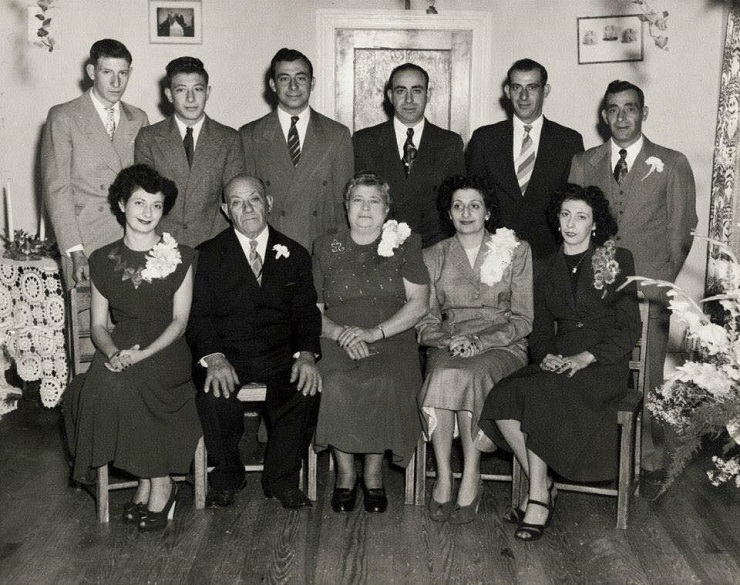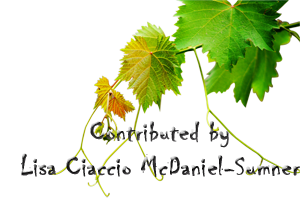|
Ciaccio Family  Back row: Sam Ciaccio, Bonnie Ciaccio, Nick Ciaccio, John B. Ciaccio, Philip Ciaccio, George Ciaccio Seated: Georgia Ciaccio Schmidt, Joseph Ciaccio, Lena Siragusa Ciaccio, Josephine Ciaccio Hutchman, Carmen Ciaccio Hood  granddaughter of John B. Ciaccio Denison Herald
August 9, 1992 Telling Our Stories Italian Heritage from Sicily to Denison by Nick F. Ciaccio Both my parents came to America from Caccamo, Sicily, near Palermo, Italy.  Papa
came first and settled in Kansas City, Kansas. Mama was a small
child when she came with her parents, who also went to Kansas City.
Papa was working for the Union Pacific railroad on the section
gang from Kansas to Denison, Texas. Grandpa also found employment
with the Union Pacific. They worked together for many years and
Grandpa really liked Papa. It was customary for parents to select
the spouses for their children. There were some requirements: 1. to be gainfully employed for at least one year, and 2. to believe "once wed to was'til death do us part and for better or worse." Needless to say, Papa had been with the Union Pacific for several years, and apparently he met the second requirement well. They were married nearly sixty years and raised nine children, six boys and three girls. Grandpa and family moved to Denison, but Papa's intention was to earn enough money to return to Italy. The grandparents, however, had a different opinion. Their daughter was not to go. After a few choice words and some tears, the grandparents won. Papa and Mama then moved to Denison. They settled in the northeast part known as "Dago Hill." Many of their relatives and friends, whose surnames included Latona, Bennitti, Siragusa, Weda, Pace, LaBella, Savano, Pistolo, Natasi, Isolano, Gagliano, Faso, and Giarraputo, were already settled there. I was the first to be born in Texas. Three brothers and two sisters had been born in Kansas. I remember as a small boy the big "family dinners." Grown-ups would tell of life in the old co untry. Conversation was in Italian. We young ones understood but would respond in English. I guess we were trying to teach each other the language we knew best. Papa told of arriving in America. They docked at New York and were kept for a time on Ellis Island. Their papers had to be processed and also they had to have a physical. Anyone with an eye problem or other disease was sent back to the old country. Some would jump ship in order to stay in America. He said the trip over the ocean was rough. He would wrap his head in a sheet and lay on the floor to keep from becoming seasick, and that still did not help much. Many Italians from Sicily were attracted to Texas because of the opportunity to buy and farm their own land. They contributed much to the agricultural development of the state. Some of them worked on the railroad, in construction, in the ice cream business or candy making, but most made their living from the land. The soil was very precious to these people. Papa and Mama's intentions were no different. They bought 130 acres of land east of Denison. We moved into a four room house that was vacated by a black family - the previous tenants. We had very few farm implements - a turn plow, a double shovel, a home-made harrow, one horse and one mule. There was very little flat land on the farm, mostly hills and gullies. The terrain was much the same shape as the land Papa left behind in Sicily. We had a few cows and pigs, but our main source of income was truck farming. Papa and the older boys did the heavy work, while the older girls and younger boys picked greens, okra, beans, onions, etc. Work was every day with cows and pigs to feel and the milking twice a day. We sold milk for five cents a quart. In the winter time with snow on the ground, Papa would cut a tow sack in half and wrap it over our shoes. The path to the milk barn was covered with what resembled giant bear tracks. Mama made her own yeast for the bread and pasta for cooking. She made jellies from the wild grapes and plums gathered along the Red River. The mustang grapes were excellent for homemade wine, which our friends called "Dago Red." Bread was baked in an outside "furno" (oven) that Papa had built from stone gathered from the farm. You could smell bread baking for blocks away, and we always had visitors about the time bread was ready. They knew there would be a loaf for them to take home. Each house had a cellar underneath that was perfect for storing canned good and fresh produce. Also there was a small, separate wine room, which was off limits to younger members of the family. Washing clothes was done by using a scrub board and #3 washtub. Drying was on a makeshift clothesline and the nearest fence. We cooked and heated with wood. We cut wood from the nearest forest and on land we also rented. All we had for woodcutting was a crosscut saw and a double bit ax. We sold firewood for five dollars a cord (delivered). In 1936 we decided to build a new house. The old one was just too small because we had three new additions to the family and we had grown quite a bit. Building had to be accomplished in our spare time. Farm work and tending livestock came first. Until this day I don't know how we managed the building, as we had no spare time. One neighbor was a carpenter, and with his help Papa, we boys, and some neighbors built the house. The outside was of stone taken from the farm land. Papa had that idea from the old country, because in Italy almost every building is stone or brick. Most of the Italians who settled in Texas brought with them a religious custom, the Feast of St. Joseph, celebrated on March 19. St. Joseph is the patron saint of Italy, particularly of Sicily. Dishes for the feast had to be prepared from fish, pasta, eggs, and vegetables. Since the Feast is during Lent, no meat is allowed. Fancy cakes and breads were decorated by the women, who worked for days preparing food. Some breads were in the shape of saws, hammers and other carpentry tools since St. Joseph was a carpenter. When World War II started, we four older boys went into the military service. Mama prayed a lot and promised to make an altar if all her sons could come home safely. Fortunately, we all returned. Papa and we boys erected an altar at one end of the long room. It was decorated with white satin. For its dedication all kinds of bread and dishes were prepared, and our neighbors and friends joined us on this occasion. We all gave thanks to our dear Lord. After the feast, the remaining food was given to the needy. Papa and Mama are now gone, as are my three older brothers. We still have the farm but it is no longer a truck farm. There's a few cows and horses, but it is mostly for memories and recreation for the younger generation. I believe we need to give thanks to Christopher Columbus for his contribution to this country. Many ethnic groups have migrated to this great land of opportunity, and each one has made a special contribution. As I have grown older, I realize what a debt of gratitude we owe to all immigrants that came to this country, not knowing what a challenge they had to meet. Leaving their families must have been a trying experience. But with faith, hope and love they strove for a better life in an unknown land. From our ancestors we should learn a great lesson of determination and perserverance and pass it on to the next generation. Together we truly have America, a government for the people and by the people. I am honored to be a citizen of these United States of America and am equally proud of my Italian heritage. I firmly believe we learn from each other and, as the saying goes, "Life is not measured by the years we live, but by the deeds that we do and the love that we give." Italian Roots Susan Hawkins © 2024 If you find any of Grayson County TXGenWeb links inoperable, please send me a message. |